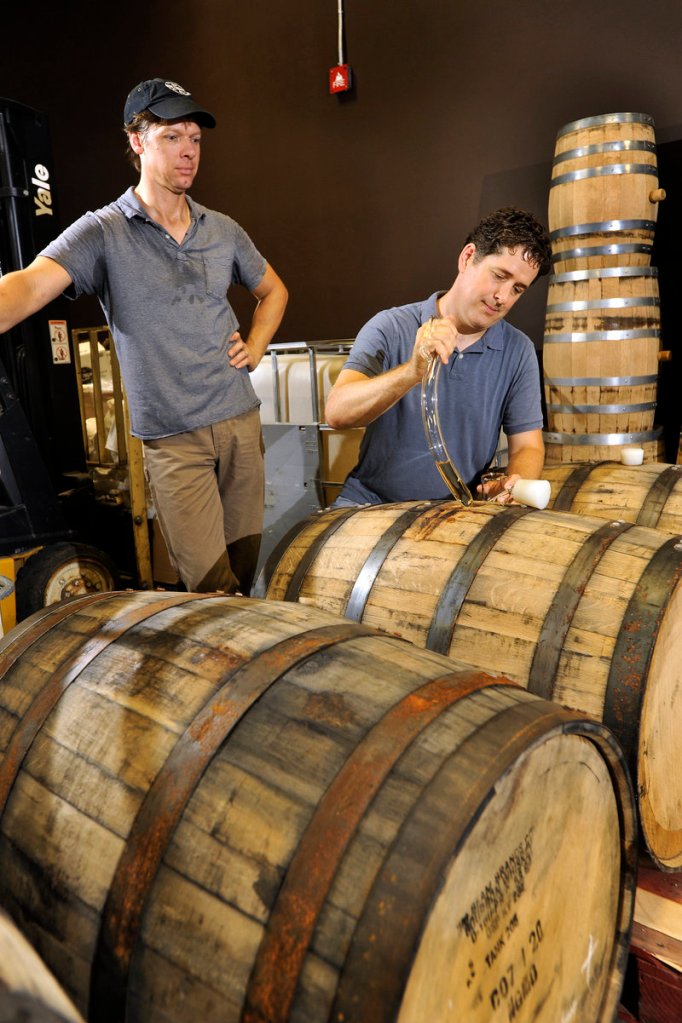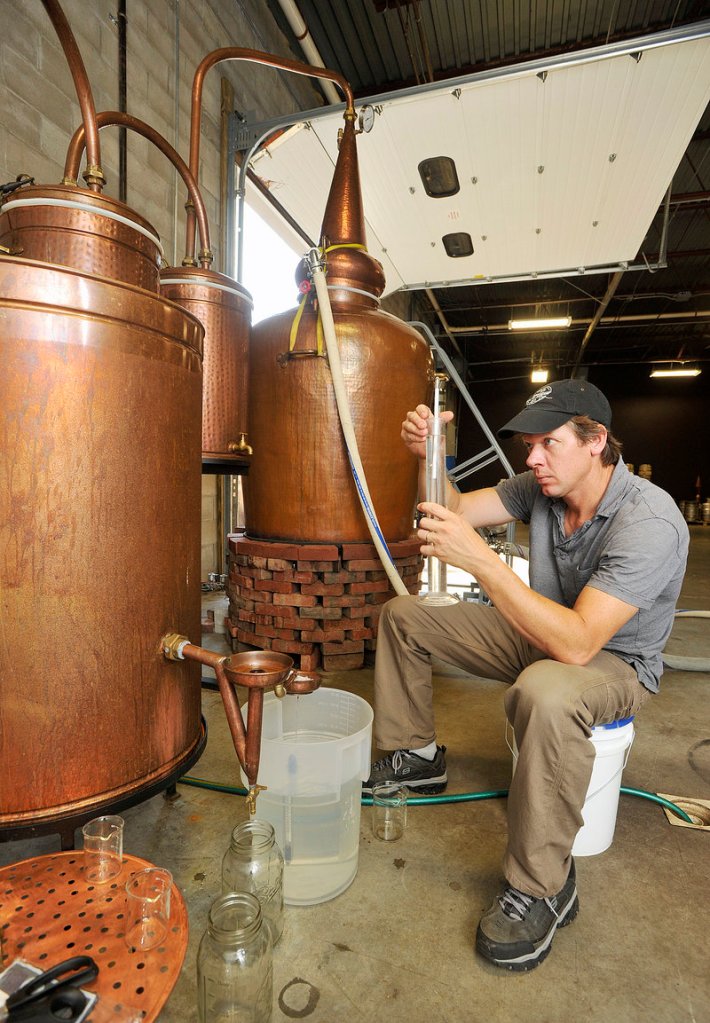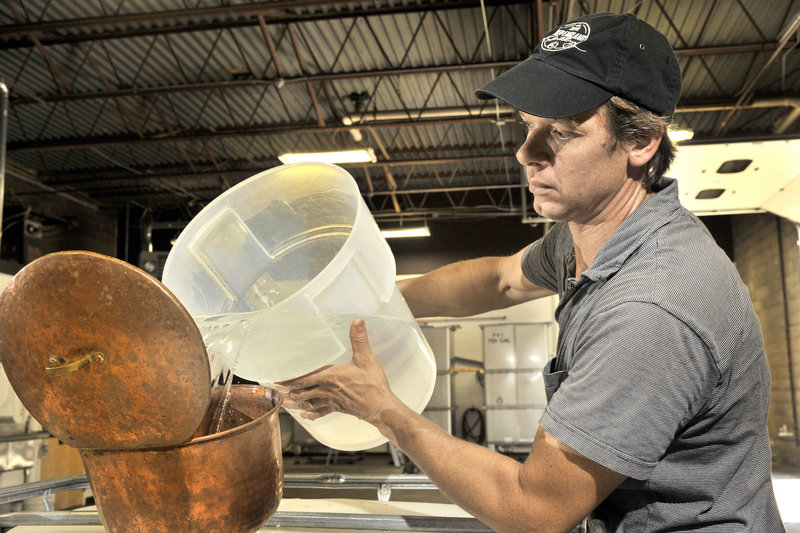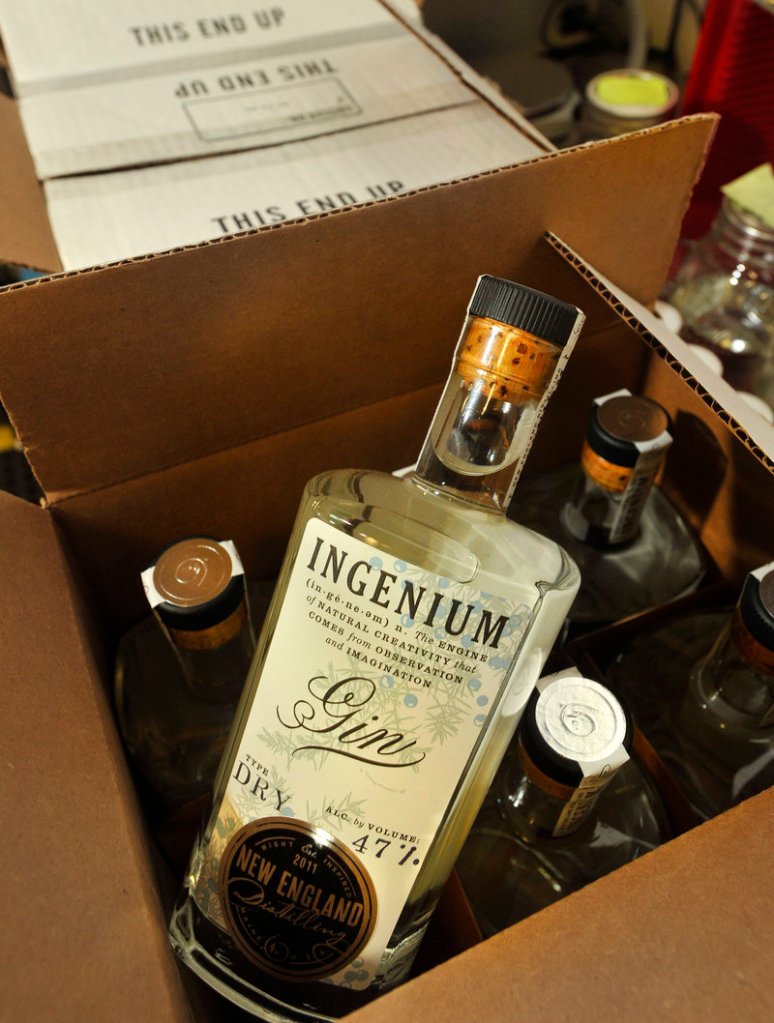PORTLAND — Ned Wight dipped into the old Jim Beam barrel and pulled out a sample of rum.
It’s not fully mature yet, and straight out of the barrel it’s still too strong to drink neat. So he diluted the sample before offering a taste.
“I’m calling the rum a traditional New England-style rum, so it’s molasses based, and matured in whiskey barrels,” Wight said. “It kind of has this whiskey character to it from the barrel, just the similar flavors of the oak and vanilla and all that good stuff coming in. It’s almost got a creamy texture to it.”
Wight’s rum, which will be bottled as Eight Bells Rum, is expected to be on the shelves by the first week in September. It’s the second artisanal spirit hand crafted by Wight’s new company, New England Distilling. His Ingenium Dry Gin, a flavorful sipping gin made with southeast Asian herbs as well as more traditional botanicals, launched in April.
New England Distilling, ensconced in one of the warehouse-like buildings off Riverside Street that have attracted lots of microbreweries, is a 21st-century update of a 19th-century family business and the only micro distillery in Portland – at least for now.
There are currently more than 350 licensed distilleries in the United States, with about 50 more under construction, according to the American Distilling Institute. With the arrival of New England Distilling, there are now six craft distilleries in Maine.
Wight credits changing taste buds and the success of microbrewed beers with the growth of craft distilleries across the country.
“Part of it is peoples’ tastes are changing, and they’re looking for more variety than I think there was in the past,” Wight said. “And you’ve got that move towards local products. I think that drives it.”
Keith Bodine, owner of Sweetgrass Farm Winery & Distillery and the maker of Back River Gin and Three Crow Rum, says he thinks it’s “great” to have more craft distillers in the state.
“Just like there are many restaurants, having many distilleries gives customers a variety to choose from,” he said. “That can only be a good thing.”
THE FAMILY BUSINESS
Wight, who used to work at Allagash Brewing Co., started thinking about reviving his family’s business, in a different form, in 2000. Then he got really serious about it five years ago.
Wight’s great-great-great-grandfather, John Jacob Wight, started making Sherwood Rye Whiskey at his distillery north of Baltimore sometime during the 1850s.
Wight grew up hearing stories about the business, which shut down during Prohibition and then went through various incarnations until 1958, when the last family distillery closed. In high school, he and his father daydreamed about starting it up again.
“My grandfather, actually, was the last member of the family to run the distillery,” Wight said. “I heard him talking, and there were always bottles from the distillery around. And I listened to my parents talk about it.”
Wight has a collection of little Sherwood Rye Whiskey bottles at New England Distilling that he bought on eBay, and he just returned from a trip to Maryland, where he reclaimed some of the old barrel racks from the old Sherwood distillery.
“It was incredible to be in the building, and then sort of start to calculate mentally how many barrels were in this building,” Wight said. “It was just unreal.”
On the wall hang old photographs, dug from the files of the local historical society, of the distillery and the people who worked there.
And yes, Wight plans to make rye whiskey again, using his old family recipe as a template. He is tweaking the recipe, though, and is in the middle of making test batches with his small pilot still. He hopes to have something out late next year.
STUDYING UP
From 2002 to 2010 or so, Wight took as many distilling courses as he could around the country, traveling to Kentucky, California, Michigan and Massachusetts, “just trying to get as much hands-on time as I could.”
In January 2011, Wight closed on his business loan and ordered a custom-made copper still from Portugal that he designed himself. The traditional, direct-fired still was hand-made in just eight weeks.
Then he hired an old friend, Tim Fisher, as a distiller to help him.
“Our fathers are best buddies,” Fisher said. “I’ve known Ned my whole life. I was looking for a new career, and Ned was looking to hire somebody, and it just kind of worked out.”
Wight and Fisher started with gin because it doesn’t need to mature like rum and whiskey, and can be ready to bottle in two to three weeks. Wight began with a base, then started adding botanicals and building it from there, the way a chef builds a good stock.
The base of Ingenium gin is a grain mash made from barley grown in northern Maine. The gin is fermented on the grain with yeast from Maine Beer Company’s Old Tom and Zoe.
“What we’ve done differently is, because we were using this local grain, we wanted to keep the local flavor,” Wight said. “You can distill out as much flavor as you want, just keep running it through the still and you strip out the flavor. We wanted to hold onto that flavor, so we’ve really held onto a lot of the grain flavor, which holds onto the grain body. It’s got almost like a whiskey mouth feel to it, like a white whisky character, that comes from the grain.”
The gin is made with a blend of traditional and non-traditional botanicals, including some southeast Asian ingredients Wight and his wife were introduced to in their travels in southeast Asia. The result is a strong herbal flavor.
The interesting shape of the bottle and the product’s label were designed by Murphy Empire, a design studio in Portland.
And what about that unusual name?
As the label says, the definition of ingenium is “the engine of natural creativity that comes from observation and imagination.” That could describe how Wight stumbled upon the name.
Wight first heard the word ingenium on a podcast about where creativity comes from, and the idea of a muse.
“Then I started looking into the word, and muse doesn’t do it justice. Its real base definition is, ingenium is when you play with stuff – play, play, play – and all of a sudden the light goes off,” Wight said, snapping his fingers. “Kids are always having these ingenium moments. They fiddle around, and then all of a sudden, discovery. That’s ingenium. And that’s really how things went given the development of the recipe.”
Ingenium won a platinum award in July at the fourth annual Spirits International Prestige (SIP) Awards, a competition where consumers are the judges.
Wight, who typically drinks the gin neat, is now having fun running around downtown Portland trying cocktails that local bartenders are making with it.
Most recently, it’s been rum running through the still and aging in old whiskey barrels.
The distillate drips all day from the still into a large glass container. “These are low wines,” Wight said, pointing to the 92 proof clear liquid dripping from the still. “They’re very coarse, but you can still smell the molasses.”
By the end of the day, the jar will contain five gallons or so of rum containing 30 percent alcohol. At bottling time, the rum will be 150 proof, and will be cut with distilled water before it’s ready for consumption.
The production of the rye will start this fall. It has to sit on the racks for a minimum of 12 months.
Somewhere, John Jacob Wight is smiling.
Staff Writer Meredith Goad can be contacted at 791-6332 or at:
mgoad@pressherald.com
Twitter: MeredithGoad
Send questions/comments to the editors.







Success. Please wait for the page to reload. If the page does not reload within 5 seconds, please refresh the page.
Enter your email and password to access comments.
Hi, to comment on stories you must . This profile is in addition to your subscription and website login.
Already have a commenting profile? .
Invalid username/password.
Please check your email to confirm and complete your registration.
Only subscribers are eligible to post comments. Please subscribe or login first for digital access. Here’s why.
Use the form below to reset your password. When you've submitted your account email, we will send an email with a reset code.